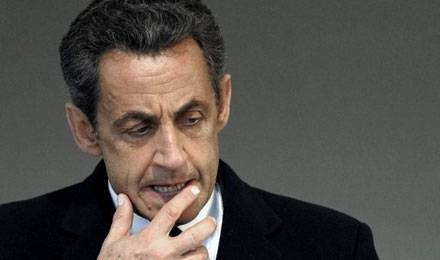Tue, 12/30/2014 - 16:52
New French words I learned in 2014
Working at FRANCE 24 offers a good vantage point to notice “new” French words - well, new to my foreign eyes. Here is a selection of French vocabulary that cropped up in 2014 and sometimes had me “reaching” for the online dictionary.
1. Trafic d’influence. Meaning: influence-peddling
The judicial woes of former French president Nicolas Sarkozy made us all brush up on our legal vocabulary this year. Trafic d’influence was one of several counts of corruption for which Sarkozy was placed under formal investigation in July. The case is a little complicated but it centres on the fact that French judges were (legally) tapping Sarkozy’s phones while investigating possible illegal funding of his 2007 presidential campaign by Muammar Gaddafi. While listening to the former president’s conversations with his lawyer, they began to suspect him of seeking inside information from a top judge about another probe he was implicated in. The influence-peddling claim stems from the accusation that Sarkozy promised the judge a plum post in Monaco in exchange for the information.

Former French president Nicolas Sarkozy. Photo: AFP.
Read FRANCE 24's article: Sarkozy placed under formal investigation in corruption probe
2. Phobie administrative. Meaning: phobia of administrative tasks.
In August, many people in France (including yours truly) discovered with horror just how much their income tax bill had gone up from the previous year. The next month, Thomas Thévenoud, a junior minister for trade, was sacked from the Socialist cabinet after less than a fortnight in the job over “problems with his taxes”. In fact, he had failed to pay his taxes for three years. It later emerged that he had not paid his rent on his Paris flat for three years either! Thévenoud, astonishingly, said he suffered from phobie administrative, which put him off such tasks. (In France, income tax is not taken out at source and has to be declared). He has now paid up in full. Although Thévenoud was thrown out of the Socialist party, he refused to give up his seat in parliament and is now sitting as an independent MP. The case was a further blow to the “exemplary republic” promised by President François Hollande during his election campaign.

MP Thomas Thévenoud. Photo: AFP
Watch FRANCE 24's video: MP Thomas Thévenoud's 'administrative phobia'
3. Barkhane. Meaning: barkhan or barchan (sand dune).
Opération Barkhane is the name of France’s new military operation in Africa’s Sahel region, aimed at countering the jihadist threat. In October, it replaced Operation Serval, which was based solely in Mali. Operation Barkhane is spread across a whopping five countries: Mauritania, Mali, Burkina Faso, Niger and Chad. And just as Operation Serval was named after that big cat which lives in the desert, Operation Barkhane is named, appropriately, after a crescent-shaped sand dune, or barchan.
Check out FRANCE 24's piece: Video: France expands its African anti-jihadist warfront
4. Ragondin. Meaning: coypu or river rat.
Like many people, I was previously unaware of the existence of the coypu, or river rat. But the large rodent suddenly became the focus of interest - and outrage - on social media after several of the creatures were mistreated by protesting French farmers in the city of Nantes in November. The ragondins were sprayed with paint and kicked. The Brigitte Bardot Foundation, an animal rights group, pressed charges over the “acts of cruelty”. A petition, calling (unsuccessfully) on President Hollande and Environment Minister Ségolène Royal to condemn the incident, gathered over 8,500 signatures.

River rats feeding. Photo posted on Twitter by @RodolpheDENIS.
Warning: This video of the farmers' protest may shock viewers.
5. Gisant. Meaning: recumbent statue.
In December, a 14th century marble head, thought to be from a recumbent statue of French queen Jeanne de Bourbon, the wife of Charles V, was sold at auction in Paris for €1.15 million to an anonymous bidder. The Piasa auction house is fairly certain the marble head was hacked off when the queen’s tomb was vandalised during the French Revolution. Acquired by a Belgian engineer “enamoured of beautiful objects” from an antiques dealer 50 years ago, the identity of the new owner of the gisant’s head remains a mystery. The only certainty is that it was not the French state.
1. Trafic d’influence. Meaning: influence-peddling
The judicial woes of former French president Nicolas Sarkozy made us all brush up on our legal vocabulary this year. Trafic d’influence was one of several counts of corruption for which Sarkozy was placed under formal investigation in July. The case is a little complicated but it centres on the fact that French judges were (legally) tapping Sarkozy’s phones while investigating possible illegal funding of his 2007 presidential campaign by Muammar Gaddafi. While listening to the former president’s conversations with his lawyer, they began to suspect him of seeking inside information from a top judge about another probe he was implicated in. The influence-peddling claim stems from the accusation that Sarkozy promised the judge a plum post in Monaco in exchange for the information.

Former French president Nicolas Sarkozy. Photo: AFP.
Read FRANCE 24's article: Sarkozy placed under formal investigation in corruption probe
2. Phobie administrative. Meaning: phobia of administrative tasks.
In August, many people in France (including yours truly) discovered with horror just how much their income tax bill had gone up from the previous year. The next month, Thomas Thévenoud, a junior minister for trade, was sacked from the Socialist cabinet after less than a fortnight in the job over “problems with his taxes”. In fact, he had failed to pay his taxes for three years. It later emerged that he had not paid his rent on his Paris flat for three years either! Thévenoud, astonishingly, said he suffered from phobie administrative, which put him off such tasks. (In France, income tax is not taken out at source and has to be declared). He has now paid up in full. Although Thévenoud was thrown out of the Socialist party, he refused to give up his seat in parliament and is now sitting as an independent MP. The case was a further blow to the “exemplary republic” promised by President François Hollande during his election campaign.

MP Thomas Thévenoud. Photo: AFP
Watch FRANCE 24's video: MP Thomas Thévenoud's 'administrative phobia'
3. Barkhane. Meaning: barkhan or barchan (sand dune).
Opération Barkhane is the name of France’s new military operation in Africa’s Sahel region, aimed at countering the jihadist threat. In October, it replaced Operation Serval, which was based solely in Mali. Operation Barkhane is spread across a whopping five countries: Mauritania, Mali, Burkina Faso, Niger and Chad. And just as Operation Serval was named after that big cat which lives in the desert, Operation Barkhane is named, appropriately, after a crescent-shaped sand dune, or barchan.
Check out FRANCE 24's piece: Video: France expands its African anti-jihadist warfront
4. Ragondin. Meaning: coypu or river rat.
Like many people, I was previously unaware of the existence of the coypu, or river rat. But the large rodent suddenly became the focus of interest - and outrage - on social media after several of the creatures were mistreated by protesting French farmers in the city of Nantes in November. The ragondins were sprayed with paint and kicked. The Brigitte Bardot Foundation, an animal rights group, pressed charges over the “acts of cruelty”. A petition, calling (unsuccessfully) on President Hollande and Environment Minister Ségolène Royal to condemn the incident, gathered over 8,500 signatures.

River rats feeding. Photo posted on Twitter by @RodolpheDENIS.
Warning: This video of the farmers' protest may shock viewers.
5. Gisant. Meaning: recumbent statue.
In December, a 14th century marble head, thought to be from a recumbent statue of French queen Jeanne de Bourbon, the wife of Charles V, was sold at auction in Paris for €1.15 million to an anonymous bidder. The Piasa auction house is fairly certain the marble head was hacked off when the queen’s tomb was vandalised during the French Revolution. Acquired by a Belgian engineer “enamoured of beautiful objects” from an antiques dealer 50 years ago, the identity of the new owner of the gisant’s head remains a mystery. The only certainty is that it was not the French state.
Tags for all blogs :
Comments or opinions expressed on this blog are those of the individual contributors only, and do not necessarily represent the views of FRANCE 24. The content on this blog is provided on an "as-is" basis. FRANCE 24 is not liable for any damages whatsoever arising out of the content or use of this blog.




0 Comments
Post new comment